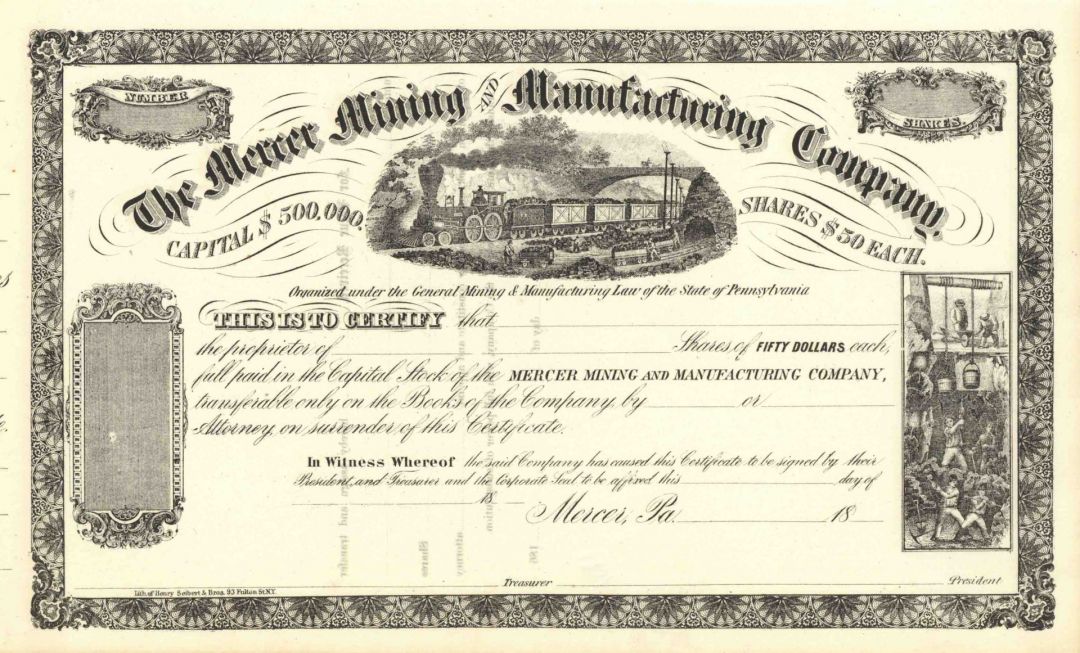Mercer Mining & Manufacturing Co. - Unissued Pennsylvania Mining Stock Certificate
Inv# MS1035 StockMining Stock. President Theodore Roosevelt owned stock in this company. Train and tunnel vignette at top center & mine workers at bottom right. Unissued. Rare!
There are two types of coal found in Pennsylvania: anthracite (the “hard coal” found in Northeastern Pennsylvania below the Allegheny Ridge southwest to Harrisburg; also called “stone coal”, “rock coal” in the 1800s) and bituminous (“soft coal”, found west of the Allegheny Front escarpment). Anthracite coal is a natural mineral with a high carbon and energy content that gives off light and heat (produced energy) when burned, making it useful as a fuel. It was possibly first used in Pennsylvania as a fuel in 1769, but its real history begins with a documented discovery near Summit Hill and the founding of the Lehigh Coal Mine Company in 1792 to sporadically send expeditions to the wilderness atop Pisgah Ridge to mine the deposits, mostly with notable lack of great success, over the next 22 years. The owners of this company were absentee management—reliant on teams of workers sent under a foreman to fell timber to build so called 'Arks' (high-sided punts), then mine coal around nine miles (today's Summit Hill) from the right bank Lehigh (the Lehigh & Susquehanna Turnpike terminus at Mauch Chunk), then trek with mule loads to fill the boats for the trip down the rapid strewn Lehigh River, and then more than 60 miles (97 km) to Philadelphia docks on the unimproved often log choked Delaware River.
The Civil War created a shift in the makeup of the anthracite coal industry. Prior to the war, the industry involved many small-scale mines with short-term leases resulting in increasing production levels but an overall trend of falling prices. In 1830 anthracite coal was selling for $11 per ton, in 1840 it was $7 per ton, and by 1860 it was $5.50 a ton in NYC, while total production was increasing. This was due in part to a general anti-charter sentiment towards the coal industry by the Pennsylvania state government, making it difficult for coal corporations to receive charters, as well as a seasonal market that experienced fluctuation in demand for anthracite. The onset of the war brought an increased need for fuel for the army, and in turn an expected increase in demand for coal. The boom of investment in the coal industry and predicted large-scale production of anthracite coal shifted the mentality of the Pennsylvania state government, and the legislature dramatically increased the number and quality of charters it granted to mining companies. Individual proprietors fell to the expansion of corporations who could master the large-scale production and efficient transportation that the wartime economy called for. The major railroad companies came to dominate the industry as they began to purchase coalfields in order to control both the production and shipping aspects. With increased concentration of capital among the smaller number of operations they were able to create deeper and deeper mining shafts to reach new levels of coal. By the end of the 19th century the Pennsylvania anthracite industry was controlled by a handful of major railroad corporations. Read more at https://en.wikipedia.org/wiki/History_of_anthracite_coal_mining_in_Pennsylvania
A stock certificate is issued by businesses, usually companies. A stock is part of the permanent finance of a business. Normally, they are never repaid, and the investor can recover his/her money only by selling to another investor. Most stocks, or also called shares, earn dividends, at the business's discretion, depending on how well it has traded. A stockholder or shareholder is a part-owner of the business that issued the stock certificates.










Ebay ID: labarre_galleries